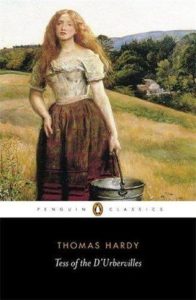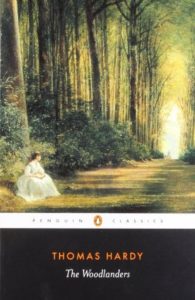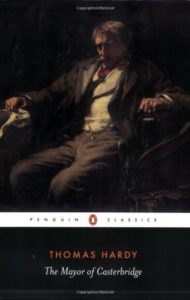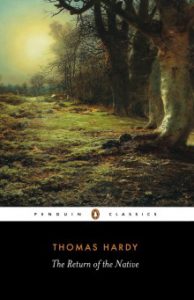This is the last of my Hardy novels for my Victorian Literature group – you can definitely see Hardy’s increasing maturity as a writer when you read them in chronological order. Having said that, however, I still think The Woodlanders my favourite. I am sure this novel has more literary merit, but Tess’s life is so grim.
Here is the plot summary from Shmoop…
Tess Durbeyfield is a (totally and completely doomed) country girl living in the late 19th Century in an English village that seems secluded, even though it’s only a four-hour journey from London. Her father learns in the first chapter that he is the last lineal descendent of the D’Urbervilles—one of the oldest, most aristocratic, families in all of England. He foolishly assumes that his aristocratic heritage will suffice to pull his family out of poverty, and so he sends Tess off to “claim kin” (i.e., to borrow money on the strength of their distant family ties) from a wealthy branch of the D’Urbervilles.
Tess is a very pretty girl, and very “womanly” (i.e., sexy) for her age, and the son of the wealthy D’Urbervilles, Alec, tries to seduce her. He finds her too proud and modest to fall into his snares, and so he tricks her into accepting a ride from him back to the family house at night, and cuts through the woods. After getting lost (possibly on purpose), Alec leaves Tess to fall asleep under a tree while he tries to find the path. He comes back, and, finding her asleep, takes advantage of their solitude to rape her under the trees.
The next phase of the book (“Maiden No More”) opens with Tess back at her parents’ house in the village of Marlott. She’s had a baby as a result of her connection with Alec, and has secluded herself from her former friends out of a combination of shame and pride. She works a few odd jobs to make money, and things are going okay until her baby suddenly gets sick… and dies. Tess is more worried about the baby’s soul than anything else, so she buries it in the churchyard on the sly.
Time passes, and most of her friends and neighbors have forgotten about Tess’s troubles. But she hasn’t, so she decides to go to a neighboring county to work at a dairy farm where nobody knows her. One of the other workers at the dairy, Angel Clare, is the son of a gentleman. Angel is learning about farming so that he can move to the colonies in America and become a wealthy farmer there. He and Tess gradually fall in love.
Tess wants to tell Angel about her past, but she can’t bring herself reveal it to him. Finally, the night before they’re supposed to get married, she slips a note under his door confessing everything. When he doesn’t say anything about it the next morning, she assumes all is forgiven—but really, he never saw the note. On their wedding night, he confesses to her that he’d had a brief fling with a strange woman in London long before he’d met Tess. So Tess feels like she can tell him about Alec, since that wasn’t her fault.
But Angel doesn’t see it that way. He’s shocked and horrified that she’s not a virgin, and runs off to South America to try and forget about her. Tess is heart-broken and wanders from job to job, trying to leave her problems behind her. But her problems keep finding her. Alec runs into her on the road, and even though he’s become a Christian, he becomes obsessed with her again. Eventually he persuades her to live with him, even though she’s legally married to Angel. But she’s given up hope that Angel will ever come back to her.
But he does come back to her, and when she sees Angel, she stabs Alec in their hotel room. Angel realizes that he’s partly responsible for the murder, and runs away with her. They flee together across the countryside, and are finally caught by the authorities at Stonehenge, an ancient monument of huge stones in the English countryside that was built by the druids or even earlier. “Justice” catches up with Tess, and she is hanged.
I listened to this one (it was read by Anna Bentinck), which, as Hardy is a poet first, means I have a much greater appreciation for how his work sounds.
I think Hardy has pyschological insight – like this (Tess has returned home after being ruined (seduced/raped) by Alec D’Urberville
Their chatter, their laughter, their good-humoured innuendoes, above all, their flashes and flickerings of envy, revived Tess’s spirits also; and, as the evening wore on, she caught the infection of their excitement, and grew almost gay. The marble hardness left her face, she moved with something of her old bounding step, and flushed in all her young beauty.At moments, in spite of thought, she would reply to their inquiries with a manner of superiority, as if recognizing that her experiences in the field of courtship had, indeed, been slightly enviable. But so far was she from being, in the words of Robert South, “in love with her own ruin,” that the illusion was transient as lightning; cold reason came back to mock her spasmodic weakness; the ghastliness of her momentary pride would convict her, and recall her to reserved listlessness again.
It must be quite unusual for a 19th century novel to have a working class heroine as its main protagonist. I am intrigued as to what contemporary readers thought.
Hardy is highlighting the complete lack of control or agency that Tess (or any woman) has over her life. Also the incredible hypocrisy and double-standards of the time – Angel cannot forgive Tess for not being innocent despite confessing a prior entanglement. There is a lot of tramping about the country side (Tess walks 15 miles to the vicarage at Eminister and back again in one day), descriptions of lush dairy country and harsh upland country. Country customs and conversations plus the usual Hardy pre-occupation with villages losing their tradespeople as life leases end.






